‘The Lost Patrol’.
3 Platoon, ‘A’ Company, 2nd Battalion, The Parachute Regiment. Belize. 1983.
During the early part of our 6 month tour of the Salamanca area of Belize (April – October 1983) a 6 man patrol, from 3 Platoon, A-Company, 2nd Battalion, The Parachute Regiment, was sent to prove a route across very difficult terrain, to the South-West of our Camp, a few miles away. This was through thick jungle going East to West towards the Quatemalan border.
The exact orders for this patrol were unclear & were also changed at the last minute.
The patrol party consisted of the following;
L/Cpl. Ian Hogarth. Patrol Commander.
Pte. Dave ‘Daddy’ Walsh. Patrol 2 i/c.
Pte. R.P. ‘Bob’ Hilton. Radio Operator.
Pte. ‘Dave’ Heal.
Pte. G.R. ‘Johnno’ Thomas.
Pte. Ian White.
The patrol was dropped off at its start point by a land-rover.
Whilst the rest of the patrol party established a camp site L/Cpl. Hogarth and Pte. Hilton went forward to check the start point for the patrol. As we stood in a dried up river bed checking the compass bearings with the map the river began to fill with water, first as a steady trickle ,but then building up to a steady flow. We quickly returned to the patrol camp site, struck camp and hurried back to the river. By the time we returned it was already ankle to knee deep. Once across we were committed to carrying on.
We only had rations for 3 days and were cut off for a week!
After two or three days of moving along a very overgrown track, and findings signs of previous patrols, but from must have been years before, we finally came to the other end, but right up against a river, which was now a raging torrent. There was nowhere to go the right or left, and we knew from the vague briefing we’d had that there was supposed to be a ford nearby, that lead to a track on the other side. Nothing could be discerned from the map, and if a ford did indeed exist it was under several feet of fast flowing water. Whist we had been stood there deliberating the situation at least two large trees had come down the river at a ferocious pace, so we also knew how hazardous a river crossing was going to be. By now also virtually down to the last of our rations – some brew kit and biscuits left – we decided to make flotation bundles and get across to the other side.
Ian split us into two parties. The first party would consist of the stronger swimmers, who would then be there in case the ‘weaker’ ones needed help, although we were all capable of swimming. We got across, don’t really know how, without any casualties, but we were all swept several hundred yards down stream. My flotation bundle had only just made it, which was to have consequences later.
We managed to locate the track on the far side, turned left (South) onto it and thought that we would be at the finish point, a village, clearly marked on the map in a couple of hours. Suddenly the track seemed to turn straight into the river on our left, and on our right was a solid wall of rock which rose straight up for what seemed several hundred feet. It was the only way to go. Turning back was not an option, to go West would lead directly through more jungle and straight towards the Quatemalan border. We tried going up the ‘wall of rock’. After about an hour and only having got approx. 100 – 150 feet up, with our full kit on, fighting order and weapons, etc, Ian realised that there was serious risk of someone falling and either being killed or seriously injured. So, we climbed back down and back-tracked to a field we’d seen with an ‘atap’ at the side. This was a type of native shelter that was all over the country and was made out of wooden poles with palm leaves for rooves. It was partly stacked with old corn husks, which were put to immediate use in adding to a fire, which would be used to dry out some of our kit, as the sun was going down.
Ian told me to get the radio – a 320 Clansman – set up to raise the Company Base. This was to prove rather difficult!
Bob Hilton: “Corporal Hogarth, there’s a problem with the radio”.
Ian Hogarth: “Well, sort it out”.
Bob Hilton: “I can’t its all wet”.
Ian Hogarth (by now with a slightly exasperated tone): “Well, f***ing well dry it out”.
Bob Hilton: “I’ll try, but it might take a while”.
Ian Hogarth (by now in an even more exasperated tone): “Why?”
In answer to this last question I just held the radio up in my hands and then turned it over, water poured from every part of it!
Ian Hogarth: “Hilton, you really are the worst radio op I’ve ever come across!”
In response to this last bit there were just guffaws of laughter from the rest of the patrol as they set up their pole beds, basha’s and tried to sort out their soaking wet kit. I was going to be very late at doing any of that, in fact it would be dark, as I now attempted to dry out the radio and establish communications with the Company Base. It took me most of the night and into the next morning to get it working, as I tried out all sorts of antenna arrangements and positions, but eventually established communications, at which Ian was able to speak to someone at Base and get them to send out a land-rover patrol to the finish point village. During the rest of the day attempts were made to establish exactly where we must be, and how far way from that village, shots were even fired into the air by the other patrol – we heard nothing!
Although we had plenty of water from the river, still a raging torrent, which we had to filter, sterilize and then boil, we were now out of food. One of the other commodities that the rest of the patrol was getting anxious about was that all their ‘ciggies’ were wet – this did not affect me – I was a non-smoker. That night, all huddled under the attap, with a small fire going, the smokers got what ciggies they had been able to salvage and carefully unwrapped the tobacco into a mess-tin, which was used to dry it out over the fire. One of them had managed to keep dry some of the ration issued toilet paper, that was quite thin, and had a very similar feel and consistency to cigarette papers. They rolled the tobacco in this, so that it resembled the biggest ‘joint’ you have ever seen in your life. It was lit and Ian had the first ‘drag’. His face turned a bright purple, followed immediately a green tinge, and having been asked what it was like, stated in a very strained voice, “okay!” Each man took a ‘drag’, same reaction and passed it on. Each one of them stating either, ‘Yeah, its fine”, or “Hey, that’s alright, after you get over the initial tatse!”. They then kept passing it around until it was finished, and declared, “that it wasn’t to bad at all”. I was amazed, and it confirmed to me that all smokers were addicted! Many years later, ‘Dave’ Walsh remembered that they also mixed in some dried ration pack tea leaves, “to make the baccy go further, that’s why it was a bit rough – I’m so glad I stopped smoking!”
On the seventh day myself and Dave Walsh went down the track to the river, to filter water in a mill-bank bag into our water bottles, in which I would put two sterilizing tablets. The river had gone down considerably by this stage but was still flowing quite fast. Whilst ‘Daddy’ got the mill-bank bag filled, and I held the water bottles, we suddenly noticed a local walking along what must have been a track on the other side of the river (it was out of sight to us on our side), and from what must have been the patrol finish point village. He got to a point almost opposite where we were, turned and stepped straight into the river! We were just staring at him open mouthed, as he appeared to walk on water – it was the bloody ford! ‘Daddy’, turned to me and told me to go tell Ian, and hurry up. I ran towards the rest of the patrol shouting, “Jesus is coming, Jesus is coming!” Of course I’d also been running along carrying all the water-bottles with some of the tops undone and water was going everywhere, and with me shouting about Jesus, Ian and the rest of the blokes, thought I had gone mad!
Eventually we established that it wasn’t Jesus, but that we did now know where the ford was. What was a bit harder to deal with was that we had burnt all this locals corn husks in our fires!
We rapidly packed all our kit, but not before Ian had spoken to the Company Base again and said we would be at the finish point village later that afternoon. We followed the local back to the ford and literally walked immediately behind him, as it was very narrow, and slippery, and one wrong move would have had you in the river and swept away. Not long after we got to the other side Ian asked the local how far it was, “not far”, he replied. It turned out that was just about all the English he knew, as we trudged on for about another three hours, and every so often asking the local “how far”, to hear the reply, “not far”, thus proving that the maps weren’t accurate, the village was nowhere near where it was marked, and that the route was not usable in the rainy season, which, as it turns out, is why the route wasn’t used!
None of this, of course, stopped the rest of the Company taking the piss out of us, and forever afterwards referring to us as ‘the lost patrol’.
Dedicated to my friend Dave Heal – may he Rest In Peace.
Source:
By Bob Hilton
Read More
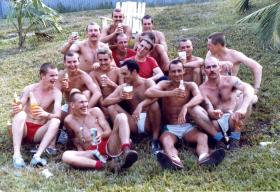
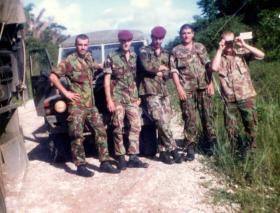
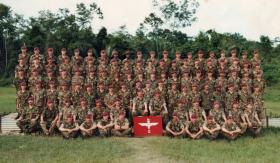
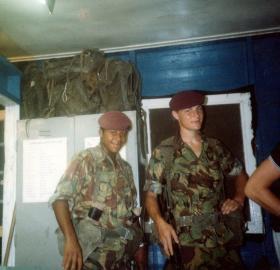
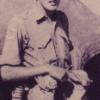
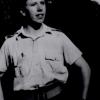
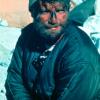
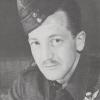
Latest Comments
There are currently no comments for this content.
Add Comment
In order to add comments you must be registered with ParaData.
If you are currently a ParaData member please login.
If you are not currently a ParaData member but wish to get involved please register.